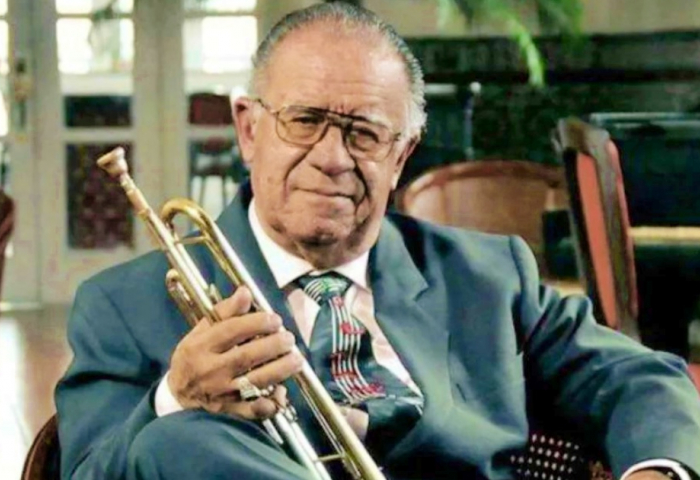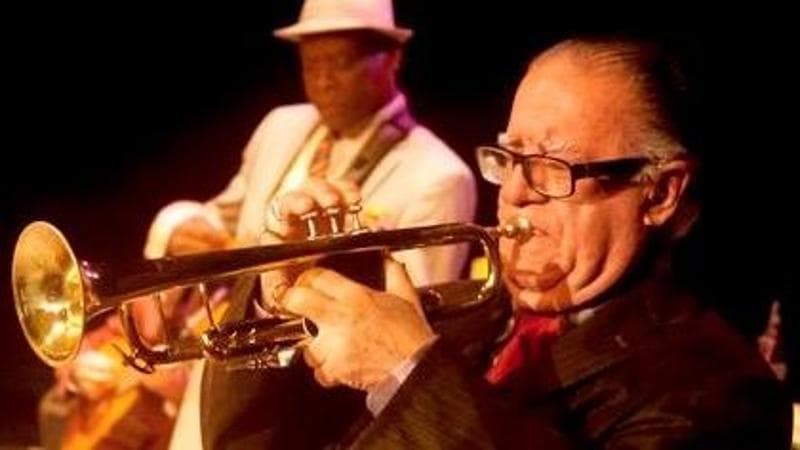
Manuel Guajiro Mirabal was an acclaimed Cuban trumpeter, celebrated for his dynamic contribution to Cuban music, especially for his work with the internationally renowned Buena Vista Social Club.
Manuel Guajiro Mirabal’s musical career, spanning over six decades, cemented him as an emblem of Cuban traditional music, particularly in the genres of son cubano, bolero, and mambo. His life is a testament to the enduring power of Cuban music on the world stage, marked by his deep commitment to the sounds of his homeland and his role in revitalizing global appreciation for Afro-Cuban rhythms.
Early Life and Musical Beginnings
Manuel Mirabal was born on May 5, 1933, in Melena del Sur, a small town near Havana, Cuba. From a young age, he was captivated by the sounds of Cuban music, especially the trumpet, which became the instrument he would master and define over his lifetime. Growing up in rural Cuba, Mirabal earned the nickname “Guajiro,” a term used for Cuban farmers or country folk, which speaks to his humble beginnings and his deep connection to his roots.
His musical journey began informally; he was a self-taught trumpeter who learned by ear, listening to recordings and performing with local bands in his hometown. His dedication and natural talent quickly caught the attention of professional musicians in Havana, and by the age of 22, he had relocated to the capital to pursue music more seriously.
In Havana, Manuel Guajiro Mirabal immersed himself in the city’s rich musical culture. The 1950s were a golden age for Cuban music, and Havana was a melting pot of musical influences, from Afro-Cuban percussion to American jazz. He performed in various dance halls and cabarets, honing his skills and adapting his playing style to fit the diverse genres that were flourishing at the time. Over the years, his dedication and love for music led him to work with numerous Cuban bands and orchestras, including the Orquesta Riverside, where he developed his signature sound.
Rising Fame: Collaborations and Musical Contributions
Manuel Mirabal became known in the Cuban music scene not only for his trumpet skills but also for his unique ability to evoke deep emotion through his playing. His style was vibrant and soulful, characterized by a sharp, bright tone that was equally adept at high-energy dance tunes and more melancholic boleros. In the 1960s, Mirabal joined the Orquesta Cubana de Música Moderna, a government-sponsored ensemble that promoted traditional Cuban music and Latin jazz, further showcasing his talent and versatility.
During this period, Manuel Guajiro Mirabal collaborated with a number of renowned musicians, including Arsenio Rodríguez, the legendary Cuban composer and bandleader often regarded as the “father of salsa.” Mirabal’s association with Rodríguez was pivotal, as it deepened his appreciation for Afro-Cuban roots music and influenced his playing style significantly. He also performed with other giants of Cuban music, such as Beny Moré, Celia Cruz, and Cachao López, who were instrumental in popularizing Cuban music internationally. Through these collaborations, Mirabal not only honed his craft but also played a part in expanding Cuban music’s influence beyond the island’s borders.
The Buena Vista Social Club Phenomenon
Manuel Guajiro Mirabal’s career took a life-changing turn in the mid-1990s when American guitarist and producer Ry Cooder traveled to Cuba with the intent of recording an album that celebrated traditional Cuban music. The resulting ensemble, the Buena Vista Social Club, included an extraordinary lineup of Cuban musicians, many of whom were legends in their own right. Among them were Ibrahim Ferrer, Compay Segundo, Omara Portuondo, and Rubén González, and Mirabal joined as the trumpeter. The project was initially conceived as a single recording session, but it would become one of the most influential global music phenomena of the decade.
.
.
The Buena Vista Social Club album, released in 1997, became an international success, receiving a Grammy Award and introducing Cuban music to a global audience. Mirabal’s trumpet was an essential part of the ensemble’s sound, adding bright, lively brass lines that complemented the rich, nostalgic melodies and rhythms of the other instruments. His contributions helped capture the authentic sound of son cubano, a genre that had largely fallen out of favor in Cuba as newer genres gained popularity.
In 1999, German filmmaker Wim Wenders released a documentary on the Buena Vista Social Club, further popularizing the ensemble and bringing Mirabal’s talent to an even wider audience. The film featured performances, interviews, and scenes of Havana, offering a poignant portrayal of the musicians’ lives and the beauty of Cuban culture. Mirabal’s passionate playing stood out, earning him admiration from fans and musicians worldwide. The project transformed Mirabal and his fellow musicians into global ambassadors of Cuban music, highlighting the island’s rich musical heritage and cultural resilience.
Solo Work and the Preservation of Son Cubano
Following the success of the Buena Vista Social Club, Manuel Guajiro Mirabal continued to work on solo projects that paid homage to Cuban musical traditions. In 2004, he released Buena Vista Social Club Presents Manuel Guajiro Mirabal, an album that focused on the classic repertoire of Arsenio Rodríguez, the influential bandleader and composer who had inspired him earlier in his career. This album was a critical success, showcasing Mirabal’s technical prowess and his reverence for Cuban music’s golden age. It highlighted his unique approach to trumpet playing, where he combined precision with an expressive, heartfelt style that connected deeply with listeners.
In his solo work, Manuel Guajiro Mirabal dedicated himself to preserving the essence of Cuban music, especially son cubano. He remained faithful to traditional arrangements and instrumentation, resisting the urge to modernize the sound. His approach was grounded in the belief that music is a vessel for memory and identity, especially in a rapidly changing world. Through his recordings, Mirabal aimed to keep the spirit of son cubano alive, ensuring that future generations could appreciate the genre’s beauty and complexity.
Impact on Cuban Music and Legacy
Manuel Guajiro Mirabal’s contributions to Cuban music extended beyond his recordings. Throughout his career, he was committed to fostering young talent and sharing his knowledge with aspiring musicians. Mirabal often taught master classes in Havana, where he would emphasize the importance of understanding Cuban music’s Afro-Cuban roots and the techniques needed to master traditional genres. He mentored numerous students, many of whom have gone on to become successful musicians in their own right, ensuring that his influence would continue to resonate in Cuban music.
Mirabal’s dedication to preserving traditional Cuban music and his role in the Buena Vista Social Club helped reignite global interest in son cubano and Afro-Cuban jazz. The success of the Buena Vista Social Club inspired other musicians and ensembles to explore Cuban music’s rich history, leading to a revival of interest in genres like danzón, cha-cha-chá, and bolero.
Manuel Guajiro Mirabal’s work also contributed to a broader appreciation of Latin American music, opening doors for musicians from across the region to share their culture and artistry with international audiences.
.

.
Over the years, Manuel Guajiro Mirabal was celebrated with numerous awards and honors in recognition of his contributions to Cuban music. His performances and recordings are now considered classics, revered by both fans and scholars for their authenticity and emotional depth. Mirabal’s work serves as a reminder of the resilience and power of Cuban music, which has endured political and economic challenges while continuing to inspire people around the world.
Later Years and Passing
In his later years, Manuel Guajiro Mirabal remained active in the music scene, performing with various iterations of the Buena Vista Social Club and participating in projects that celebrated Cuban culture. His commitment to music never wavered; even as he aged, he continued to play with the same passion and dedication that had defined his career. Mirabal was a beloved figure in Havana, often seen performing at venues around the city, where fans and tourists alike would gather to witness a living legend in action.
On October 28, 2024, Manuel Guajiro Mirabal passed away at the age of 91, leaving behind a profound legacy in Cuban music. His death marked the end of an era, as he was one of the last surviving members of the original Buena Vista Social Club ensemble. Tributes poured in from around the world, with fans, musicians, and cultural organizations honoring his contributions to Cuban music and his role in shaping global perceptions of Cuban culture. Mirabal’s passing was a significant loss, but his music continues to live on, inspiring new generations of musicians and listeners.
Legacy and Influence on Future Generations
Manuel Guajiro Mirabal’s legacy is deeply embedded in the narrative of Cuban music. His career, marked by a steadfast commitment to traditional Cuban sounds, serves as a powerful example of how music can bridge cultures and transcend borders. The success of the Buena Vista Social Club proved that there is a universal appeal to authenticity, and Mirabal’s dedication to preserving the essence of son cubano has inspired countless musicians both in Cuba and abroad.
Manuel Guajiro Mirabal’s influence extends beyond his recordings; he was a cultural icon who represented the spirit of Cuba’s musical heritage. His story is a reminder of the importance of preserving cultural traditions, especially in a globalized world where these traditions are often at risk of being forgotten. For Cuban musicians, Mirabal’s life is a testament to the power of dedication, passion, and love for one’s art, qualities that are crucial for sustaining and evolving cultural practices.
In the wake of his passing, Manuel Guajiro Mirabal’s music remains a powerful testament to the richness of Cuban culture. His recordings with the Buena Vista Social Club, his solo work, and his collaborations are celebrated by fans and musicologists alike, offering a glimpse into the heart of Cuban music. Manuel Guajiro Mirabal’s life and career have left an indelible mark on the world, ensuring that his contributions to music and his love for Cuba will be remembered for generations to come.
Check out Manuel Guajiro Mirabel on Amazon.
Check out Buena Vista Social Club on Amazon.
If you found this interesting please share it with your friends and family, and check out some of our other articles on Musicians who Died in 2024.
.

